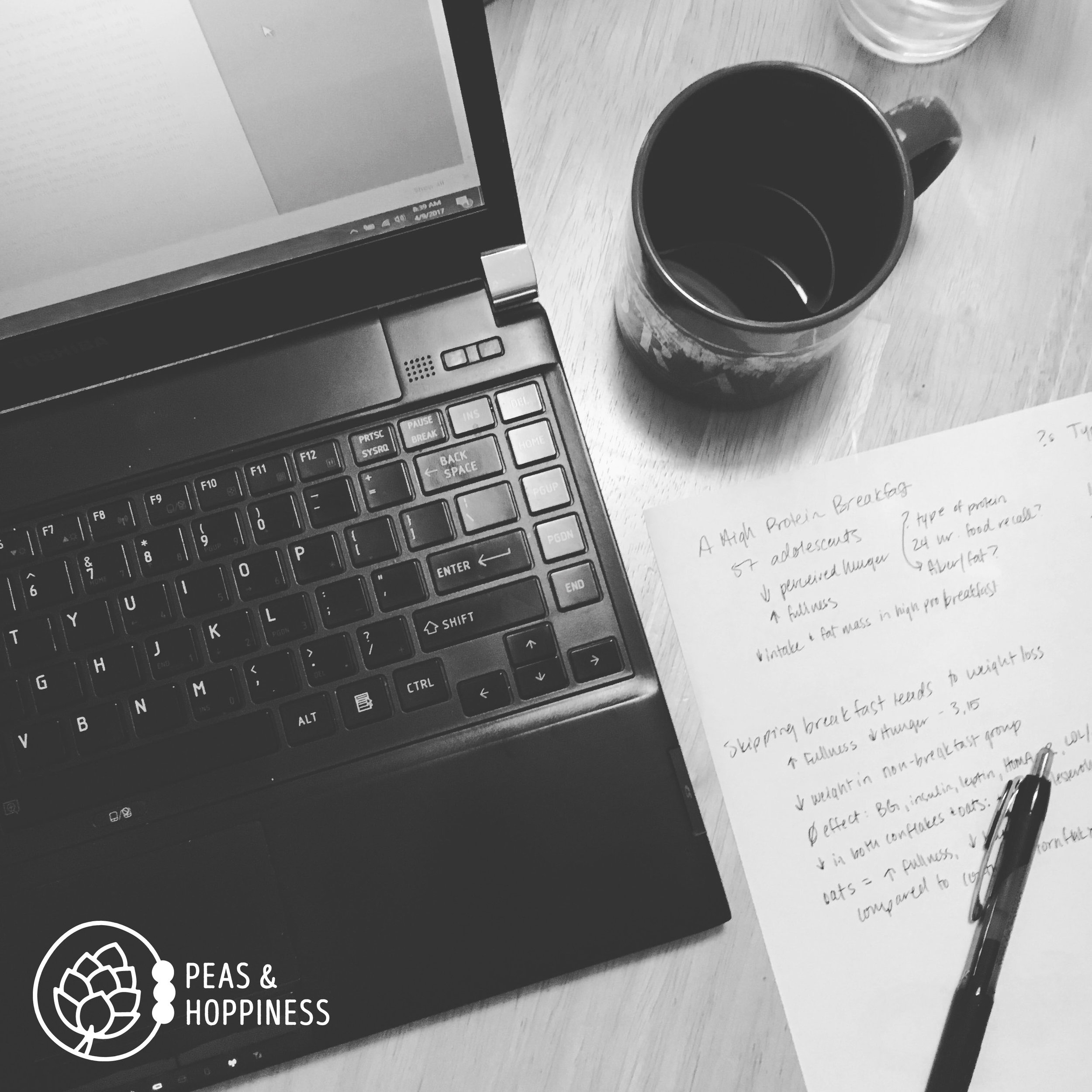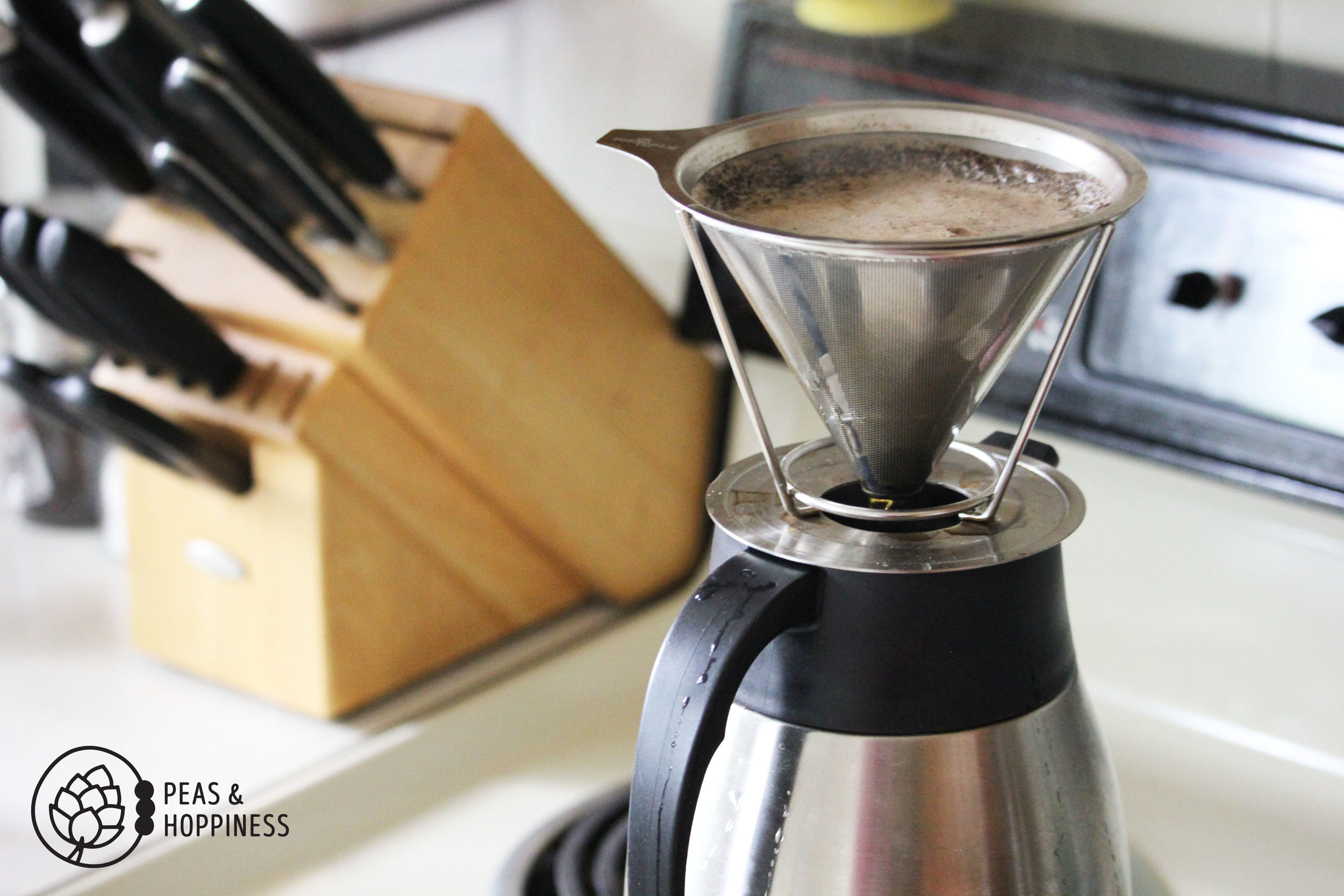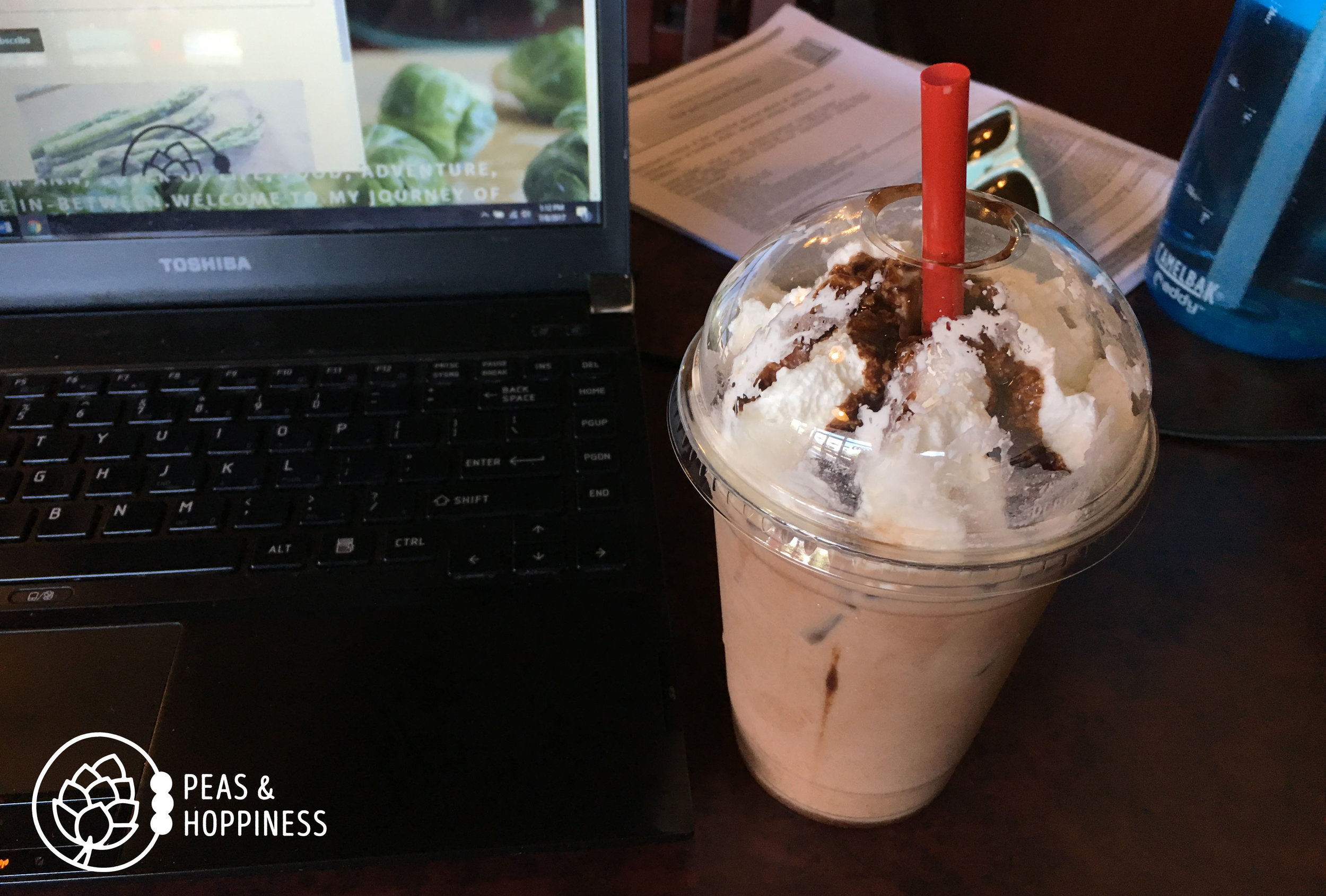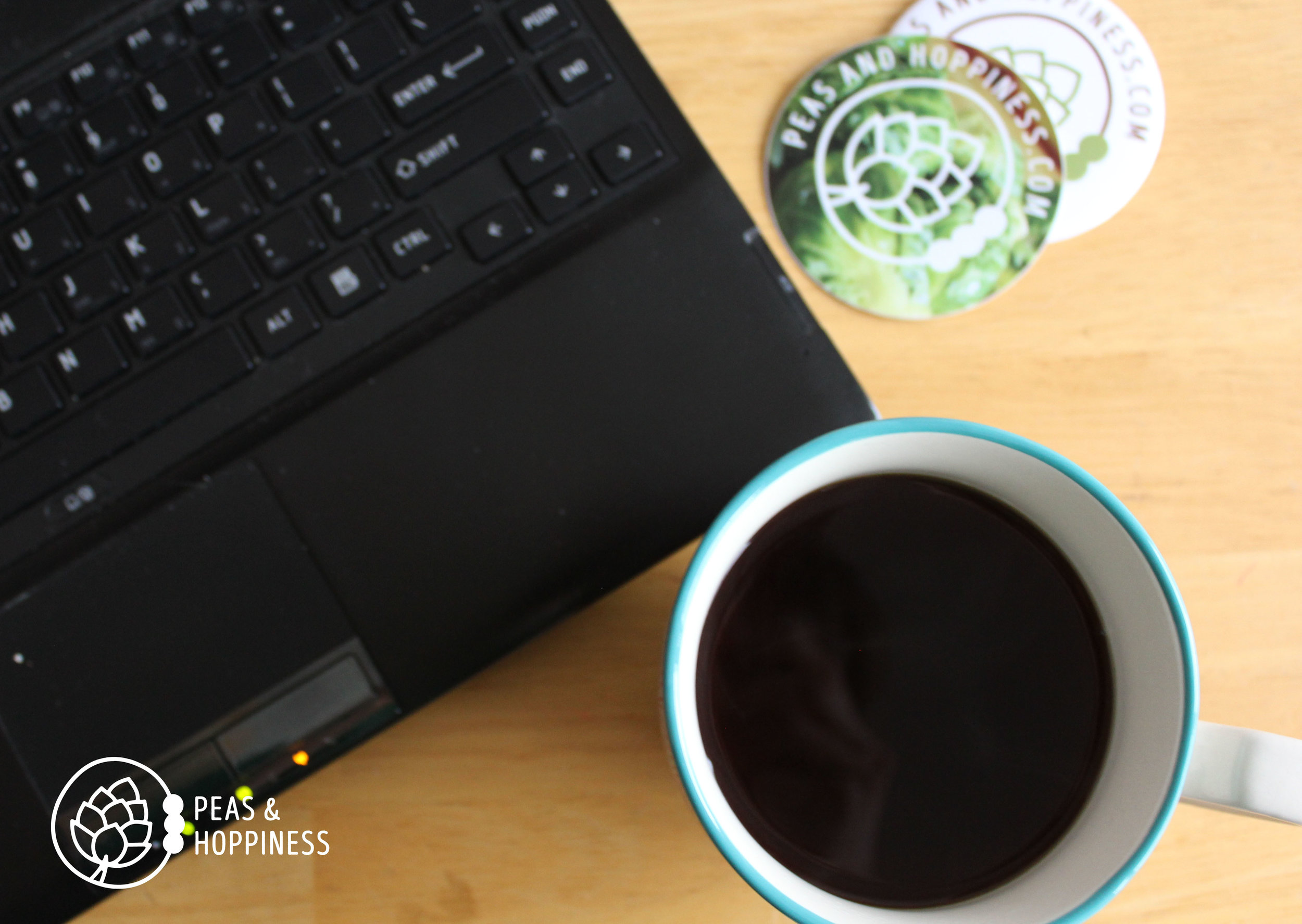
My workspace while blogging, always complete with a cup of black coffee in the morning
Is coffee good for you? How much coffee should you drink in a day? Can pregnant women drink coffee? Today I explore the science behind this popular morning beverage.
I’m a coffee lover. Black coffee. Coffee with cream. Fancy pumpkin spice lattes.
Although I’m a self-proclaimed coffee snob, I’ll actually drink any coffee in a pinch. My favorite? A freshly ground cup of high-quality French press coffee.
Lucky for me, more and more nutrition research is pointing to the health benefits of this sweet nectar of life. So if you’re a fan of coffee, here is your daily dose of good news: although there has been debate about the health benefits of coffee throughout the last few decades, the most recent publication of the Dietary Guidelines for Americans concludes that moderate intake of three to five 8-ounce cups of coffee per day can be incorporated to a healthy eating pattern.
Read on to find out why the guidelines announced this conclusion.
Coffee Improves Heart Health
Moderate coffee consumption (that is, three to five cups per day) is associated with a decreased risk of coronary heart disease and stroke. High consumption (six or more cups per day) was not associated with either increased or decreased risk.
It’s true that coffee can raise blood pressure right after drinking the stuff. Long-term consumption of coffee is also associated with slightly higher risk of high blood pressure. However, coffee’s association with decreased C-reactive protein and E-selectin, two inflammatory markers, means that overall cardiovascular effects are mostly positive.
There is a U-shaped curve of relative risk for coffee consumption. Risk of cardiovascular disease (CVD) decreases as consumption increases from zero cups to 3-5 cups, then risk increases again with increased consumption.
Thus, the overall benefits of moderate coffee intake appear to outweigh the negative consequences of the high blood pressure concerns (Ding, et al.).

Pourover-style coffee: for the ideal water temperature to make the perfect cup of coffee.
Coffee Decreases the Risk of Type 2 Diabetes
Both caffeinated and decaffeinated coffee have been shown to have a dose-dependent inverse correlation with risk of type 2 diabetes.
What does this mean? The more (black) coffee you drink, the lower the risk of developing type 2 diabetes.
Researchers aren’t sure of the exact reason for this association, but it may be due to components in coffee such as chlorogenic acid. The thought is cholorgenic acid reduces absorption of carbohydrates in the gut, works as an antioxidant, and stops the liver from releasing too much stored glucose (Ding, et al).
Chlorogenic acid also may increase the body’s sensitivity to insulin, which is the hormone that opens cells to allow sugar to pass from the blood into cells to be used as insulin. Insulin resistance (when the body doesn’t use insulin efficiently) is a primary factor in type 2 diabetes.
In short, consuming the aforementioned 3-5 eight-ounce cups of coffee per day appears to lower risk of type 2 diabetes.
Coffee Reduces the Risk of Liver Cancer
A recent meta-analysis of research studies found that increasing coffee consumption by two cups per day reduces risk of developing hepatocellular cancer (HCC) by as much as a third. Researches believe this is due to inherent anticarcinogenic properties of coffee.
The association was strongest for caffeinated coffee, but there was also an inverse relationship found between coffee consumption and HCC risk found with decaffeinated coffee, albeit to a lesser degree. Caffeine itself appears to reduce reproduction of HCC cells (Kennedy, et al).
Coffee Reduces the Risk of Depression
I knew it: drinking coffee makes you happy!
Observational studies indicate depression decreases in a linear relationship with the increase in coffee; each additional cup of coffee reduced risk of depression by 8% in this meta-analysis (Wang 2015). Ideal amounts of caffeine appear to be between 68-509 mg per day. This is equal to one to five (8 oz) cups of coffee.

It’s sugar-free, but not fat-free. I thoroughly enjoyed replenishing the calories I burned during my morning run with this “Heath Bar” iced coffee. Yum!
But I thought that Coffee can be “Bad” for You… ???
If coffee is so good for you, what’s with all the bad press?
The difference is that fancy coffee drinks are often loaded with added sugar and unhealthy fat.
When I talk about the health benefits of coffee, I’m talking about black coffee. Unfortunately lots of people add lots of stuff to coffee, which can offset a lot of these benefits.
Take the delicious White Chocolate Mocha Frappuccino from Starbucks. A grande size (that’s “medium” for those of you like me who don’t speak Starbucks) weighs in at a whopping 330 calories and 66 grams of carbohydrates – 64 grams of which are pure sugar. That’s as much sugar as a can of soda and twice the calories!
Although as you can see from the photo I love to include drinks like these on occasion, but it’s important to note that the brain doesn’t register liquid calories as well as it does whole food. Meaning it’s easy to consume lots of calories without feeling full – and in the end, this can make it difficult to follow your body’s natural hunger-fullness cues.

Incredible breakfast and real cream. Couldn’t say no to adding a little to my coffee on this special occasion!
Safety of Coffee and Caffeine
A moderate intake of caffeine has been cleared for almost all types of people – including pregnant women and children. Here are the guidelines (Wikoff, et al):
Healthy Adults: 400mg caffeine/day, about 4.2 eight-ounce cups of coffee
Pregnant Women: 300mg caffeine/day, about 3 eight-ounce cups of coffee
Adolescents: 2.5 mg caffeine/kg body weight/day. For a 100-pound kiddo, this is just over 100mg/day, which is more likely to be consumed in energy drinks and soda rather than coffee, I’d imagine
Toxicity of Caffeine: Caffeine is a stimulant and so it’s possible to overdose. However, the only cases of toxicity of caffeine have been related to consuming caffeine in a more pure form, such as an anti-sleeping medication or supplement. Some studies show that a dose of caffeine more than 10g (that’s 10,000 mg) may be fatal. This is equal to about 105 cups of coffee. I really wouldn’t recommend this intake for a variety of reasons, though…
The Bottom Line: Is Coffee Good for You?
In moderation, black coffee appears to impart some health benefits. The data aren’t yet strong enough for me to encourage people to start drinking coffee if they aren’t already doing so. For example, some people who are sensitive to caffeine and whose sleep patterns might suffer if they start drinking coffee wouldn’t be good candidates for this advice, as the negatives would likely outweigh the positives.
But for those of you who enjoy a cup (or three or five) of Joe in the morning, the good news for you is this appears to be safe and even possibly healthy.
So cheers to your healthy morning beverage!
Ann from Peas and Hoppiness.
Interested in more evidenced-based nutrition information? Check out these related blog posts:

Cheers!
Sources
“Coffee & Health.” Harvard School of Public Health, 28 Feb. 2014. Web. 08 July 2017. <https://www.hsph.harvard.edu/news/multimedia-article/benefits/>.
Ding, M., S. N. Bhupathiraju, M. Chen, R. M. Van Dam, and F. B. Hu. “Caffeinated and Decaffeinated Coffee Consumption and Risk of Type 2 Diabetes: A Systematic Review and a Dose-Response Meta-analysis.” Diabetes Care 37.2 (2014): 569-86. Web. 9 July 2017. PDF
Kennedy, Oliver John, Paul Roderick, Ryan Buchanan, Jonathan Andrew Fallowfield, Peter Clive Hayes, and Julie Parkes. “Coffee, including caffeinated and decaffeinated coffee, and the risk of hepatocellular carcinoma: a systematic review and dose–response meta-analysis.” BMJ Open7.5 (2017): n. pag. Web. 8 July 2017. PDF
O’Keefe, James H., Salmon K. Bhatti, Harshal R. Patil, James J. DiNicolantonio, Sean C. Lucan, and Carl J. Lavie. “Effects of habitual coffee consumption on cardiometabolic disease, cardiovascular health, and all-cause mortality.” Journal of the American College of Cardiology 62.12 (2013): 1043-051. Web. 9 July 2017. PDF
U.S. Department of Health and Human Services and U.S. Department of Agriculture. 2015–2020 Dietary Guidelines for Americans. 8th Edition. December 2015. Available at http://health.gov/dietaryguidelines/2015/guidelines/. PDF
Wang, Longfei, Xiaoli Shen, Yili Wu, and Dongfeng Zhang. “Coffee and caffeine consumption and depression: A meta-analysis of observational studies.” Australian & New Zealand Journal of Psychiatry 50.3 (2015): 228-42. Web. 8 July 2017.
Wikoff, Daniele, Brian T. Welsh, Rayetta Henderson, Gregory P. Brorby, Janice Britt, Esther Myers, Jeffrey Goldberger, Harris R. Lieberman, Charles Obrien, Jennifer Peck, Milton Tenenbein, Connie Weaver, Seneca Harvey, Jonathan Urban, and Candace Doepker. “Systematic review of the potential adverse effects of caffeine consumption in healthy adults, pregnant women, adolescents, and children.” Food and Chemical Toxicology(2017): n. pag. Web. 9 July 2017. PDF